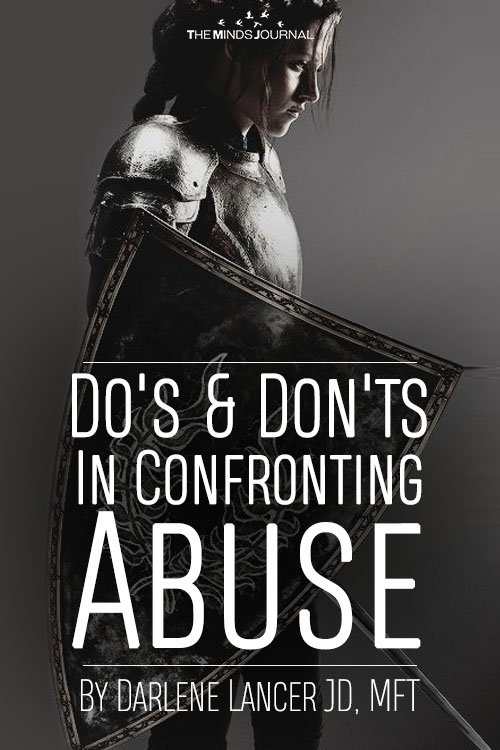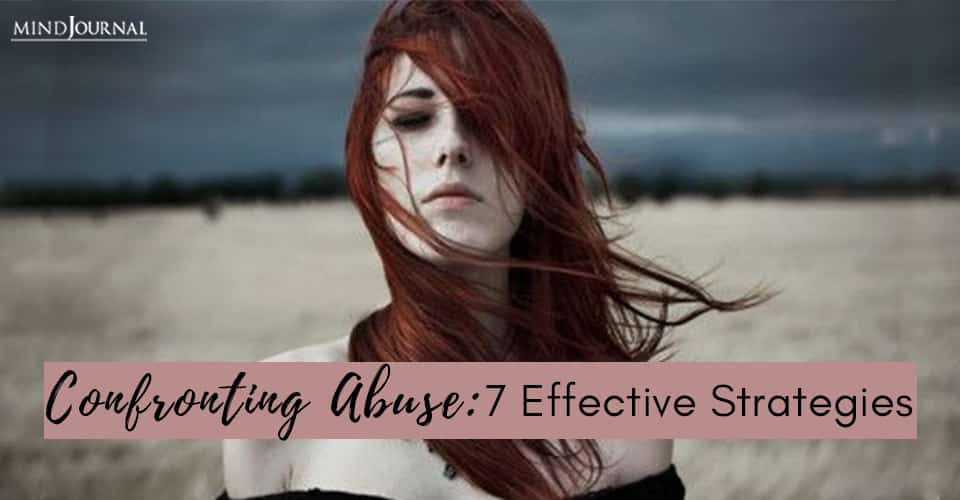Revealing the ‘Do’s And Don’ts’ in confronting abuse: Abuse is about having power over someone. Abusers typically want to feel superior and to control and dominate.
To abusers, communication is not about understanding. It’s a win-lose game.
They use verbal abuse and/or violence to accomplish this. They’re frequently self-centered, impatient, unreasonable, insensitive, unforgiving, lack empathy, and are often jealous, suspicious, and withholding.
Their moods can shift from fun-loving and romantic to sullen and angry. Some punish with anger, others with silence–or both. It’s often “their way or the highway.”
They can be bullies. Typically, abusers deny any responsibility and shift blame to their loved ones and co-workers. The one thing they all have in common is that their motive is to have the upper hand. This is because they don’t feel that they have personal power, regardless of worldly success. Often, they behave the way they were treated growing up, and their insecurity, shame, and rage from childhood drives them.
Allowing abuse damages our self-esteem. To respond effectively requires support. It’s difficult to face it without others who will validate our reality.
This is especially true if we’ve been abused for any length of time. Without outside support, our compromised self-esteem leads to self-doubt, insecurity, isolation, and increased dependency on the abuser.
So, you must know do’s and don’ts’ in confronting abuse and save yourself.
Related: How To Stop Feeling Sorry For Toxic People
Common mistakes in confronting abuse that escalates the conflict
It’s important to understand the motives and mindset of an abuser; otherwise, victims of abuse commonly make the following mistakes that contribute to more abuse.
1) Appeasement
Most victims try to placate an abuser to de-escalate conflict and anger. This tactic only empowers the abuser, who sees it as weakness and an opportunity to exert more control. Pleading sends the same message.
2) Arguing
Verbal fights with an abuser lead to more resentment on both sides. As anger escalates, so does abuse. Nothing is gained. You lose and can end up feeling more victimized, hurt, and hopeless.
3) Explaining and Defending
When you’re wrongly blamed or attacked, trying to defend and explain yourself, beyond a simply denying a false accusation, leaves you open to more abuse.
This behavior is often based on a desire to seek the abuser’s approval. However, the motive of the abuser is to have power over you.
So if you’re seeking approval, this dovetails with the abusers M.O. Thus, explaining and defending yourself sends this message: “You have power over my self-esteem. You have the right to approve or disapprove of me. You’re entitled to be my judge (i.e., parent).”
Related: How Emotionally Intelligent People Handle Toxic People
4) Seeking understanding from the abuser
This is a futile objective, yet drives the behavior of victims who desperately want to be understood. They mistakenly believe or hope that the abuser is interested in understanding them, while the abuser is only interested in winning a conflict and having the superior position.
Arguing over the facts is thus irrelevant. Most abusers aren’t interested in the facts, only justifying their position and being right.
5) Criticizing
Because abusers are basically insecure, although they may act tough, inside they’re fragile. They can dish it, but can’t take it. Criticizing an abuser can provoke rage and vindictiveness. It’s more effective to be assertive and communicate your needs.
Related: 11 Signs It’s An Emotionally Abusive Relationship And You Might Not Even Realize
Effective Strategies for Confronting Abuse
There are effective ways to deal with abuse, although they aren’t our gut reaction. They require education and forethought.
Here are positive steps you can take to deal with abuse.
1) Get information about abuse
Learn all you can about emotional abuse and codependency. People in abusive relationships tend to be codependent.
2) Get support
Individual therapy, as well as attending 12-Step meetings, such as Al-Anon or CoDA, can be immensely helpful. If you’re being physically abused, get information about legal resources, hotlines, and shelters in your area, and read more tips.
3) Detach
Learn to not react or take personally the words and actions of an abuser. Not reacting is the first step toward empowerment.
4) Raise your self-esteem
This will help you trust your reality, give your more options, and empower you to confront abuse. Begin by stopping any self-criticism, and then take action to rebuild your self-worth.
Related: 5 Ways to Stay Sane Among Toxic People
5) Become assertive
Learn to be assertive, rather than passive, placating, nagging, criticizing, or aggressive. Get How To Speak Your Mind―Become Assertive and Set Limits and the webinar How to Be Assertive.
6) Set Boundaries
Learn to set boundaries. (Also explained in the resources in #5.) If you think you have done so, but that they’re not working, read “10 Reasons Why Boundaries Don’t Work.”
Related: How To Handle Narcissistic Abuse
7) Be Strategic
If you’re dealing with someone highly defensive or with a personality disorder, there are specific strategies to having an impact.
Keep in mind these do’s and don’ts in confronting abuse and you’ll surely be able to deal with it.
© Darlene Lancer 2018 Written by Darlene Lancer Originally Published on WhatIsCodependency.com











Leave a Reply